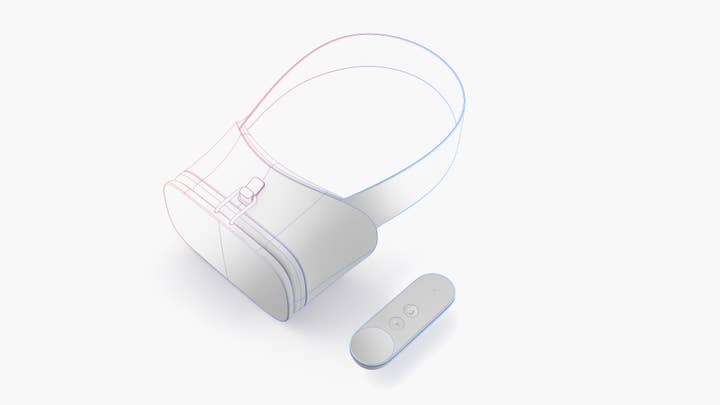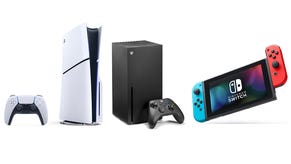Daydream could make mobile VR matter
Weekly recap: Mobile VR gets a big push, Nintendo goes Hollywood, and E3 may mark the beginning of half-step console upgrades
The world of mobile VR has just been given a jolt, courtesy of Google. While all the buzz in 2016 has been around the launches of Oculus Rift and HTC Vive, this week's big reveal of the Google Daydream platform is arguably the most important thing to happen to virtual reality this year. The fact is that most people are not going to buy super-powered desktop computers on top of expensive VR headsets. They will, however, continually purchase new smartphones, and Google's Daydream design will ultimately make VR far more accessible for the average consumer. If VR is ever to become a mainstream entertainment option, whether for games, movies or anything else, this is a necessary step.
While Google isn't making its own VR hardware, the company is releasing a universal design of sorts that can be used across the Android ecosystem. Gear VR is great for mobile VR enthusiasts (and it's now sold 300k units across Europe) but you have to own a Samsung phone of course. "VR should be mobile, approachable, and for everyone," said Google's VP of VR Clay Bavor.
Resolution Games' CEO Tommy Palm commented, "With Daydream's potential reach and accessibility and the current mobile VR headsets on the market, mobile is on track to become the number one VR platform in regards to headsets in the marketplace and potential for mainstream adoption."
VR was all the rage at this year's GDC, but with the E3 Expo looming on the horizon, it's starting to look like new consoles will be the big focus at this E3. Reports of a PS4.5 continue to circulate and now rumors are pointing to Microsoft having an answer. It's believed that Microsoft is getting ready to unveil a new Xbox One controller and, more importantly, a new piece of hardware that may possibly be a half-step console for the Xbox One. Xbox boss Phil Spencer hinted at such an announcement already in March when he remarked that "there's no reason why console can't ride that same curve," when asked about smartphone upgrade cycles. If the reports prove true and both Sony and Microsoft show off new half-step PlayStation and Xbox hardware, it's going to represent a radical departure for the console industry. The days of five-year (or longer) console cycles will be replaced with continual upgrades to hardware, and it'll take some time for the industry to adjust its business models appropriately. Should consoles be subsidized if you subscribe to Xbox Live or PlayStation Plus? Will they be leased as some carriers now do with the latest iPhones? Will consumers and developers be receptive to the sweeping changes?
Even the CEOs of major publishers are clearly thinking about what the faster upgrade cycle in gaming hardware will mean for this industry moving forward. At an investor day this week, EA head Andrew Wilson remarked, "When we think about the future of more people playing more games, a couple things are going to be true. One, I as an individual am going to play games across more than one device. In fact, I'm going to play different games across different devices. I'm going to refresh those devices on a much faster cadence. Our industry operated for the longest time on a six-year refresh rate. Now it's a six-month refresh rate, and it's asynchronous with our friends. We don't all necessarily upgrade our phone or our TV at the same time."
The introduction of new half-step consoles at E3 also couldn't be better timing for the show, which has seen its ongoing relevance repeatedly called into question. With publishers pulling out of the trade show left and right, if both Microsoft and Sony choose to display new hardware on the show floor, it instantly sends a signal to the industry that E3 still matters a whole lot. The digital transformation of gaming has hit E3 hard, but hardware necessitates a strong retail presence, and E3 remains a retail-oriented show even in 2016.
Nintendo, meanwhile, may not be on board the half-step console train, but it desperately needs to make a big splash with the NX in 2017 if the company wants to remain relevant at all in interactive entertainment. With 3DS sales declining and the Wii U having never taken off, Nintendo is now examining its business to see what opportunities it can pursue. Beyond the obvious mobile efforts that started with Miitomo, Nintendo this week made it clear that it's going to mine its own valuable IP for Hollywood movie potential. Given the disaster that was the Super Mario Bros. film in 1993, Nintendo has wisely decided that live-action filmmaking is not the way to go. Frankly, it's surprising that Nintendo didn't look to maximize its IP potential with animated movies earlier. While Rovio goes around blatantly comparing itself to Disney with but one viable property to its name, if anything it's Nintendo that has earned the Disney-like accolades with its stable of popular characters and family-friendly disposition. Elsewhere in the world of Nintendo, the company has apparently not given up on its goal to pursue medical and health devices. Time will tell if this ever becomes a truly viable option for the firm though.
Finally this week, we'd be remiss if we didn't give a shout out to now former EA executive Rich Hilleman, who revealed that he's left the publisher after more than 30 years. Hilleman was just the 39th employee at EA and became an influential designer for the leading publisher's Madden franchise among others. Hilleman's one of the industry's true pioneers and we wish him well in whatever endeavor he takes on next.
Other news in brief...
- StarBreeze has changed its fiscal year to align with the calendar year while reporting a net loss but an increase in revenues. The Swedish company also provided more details on its VR plans and Smilegate deal.
- Research firm Newzoo has released its latest report on the Asian games market, which shows that while Asian public game companies generated 32 percent of their revenues outside of Asia, non-Asian public game companies could only manage 16 percent of their revenues within Asia.
- Epic Games has handed out another $75,000 in Unreal dev grants to five teams "for their inspiring work and impactful contributions made available to developers and players everywhere."
- eSports startup Dojo Madness, which provides eSports coaching tools, has raised $4.5 million in Series A funding from March Capital Partners and other investors.
- The International Mobile Gaming Awards (IMGA) will host the first-ever mobile games competition in Southeast Asia on November 8, 2016, in partnership with Malaysia Digital Economy Corporation (MDEC). The call for entries is open here.









